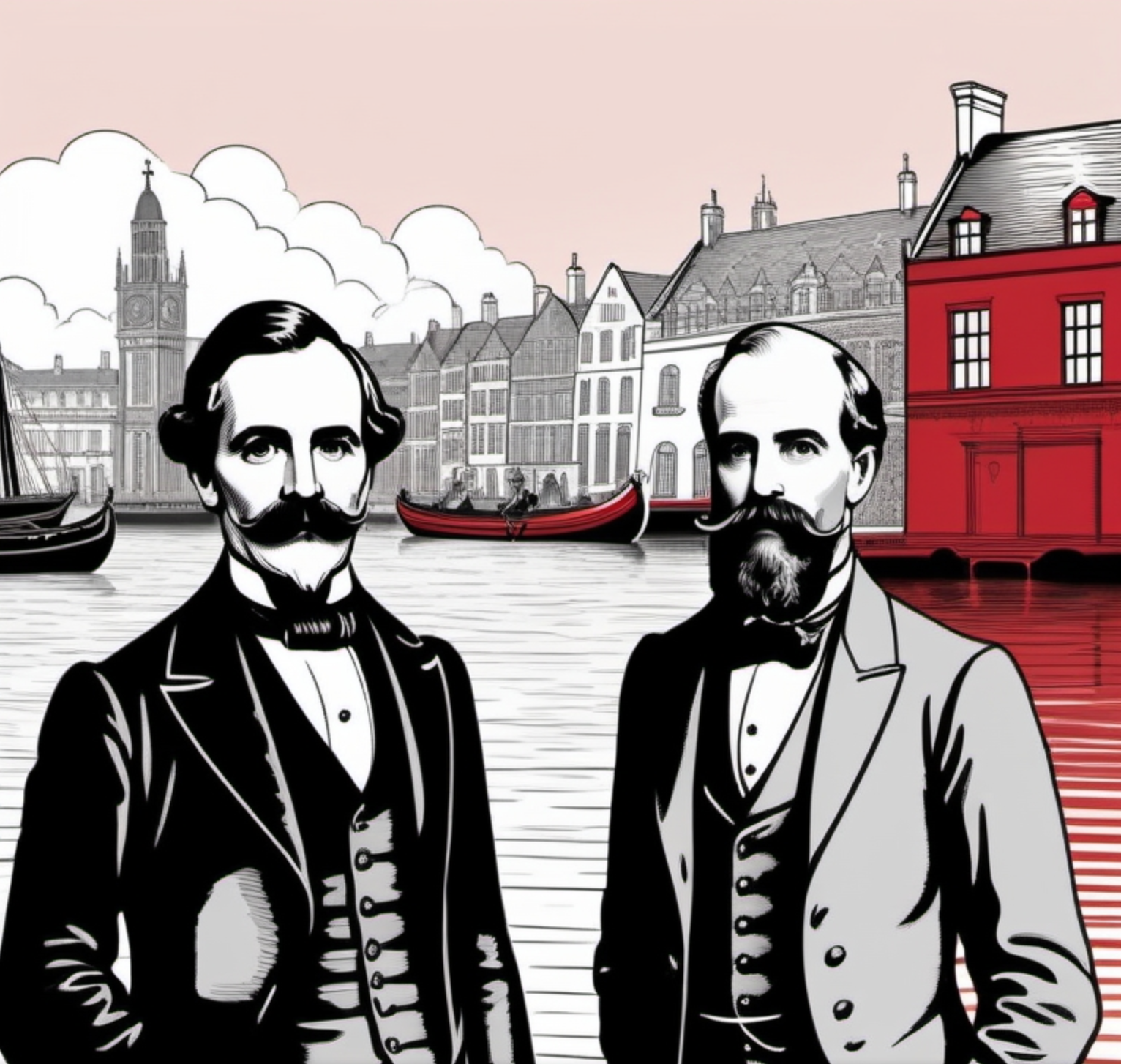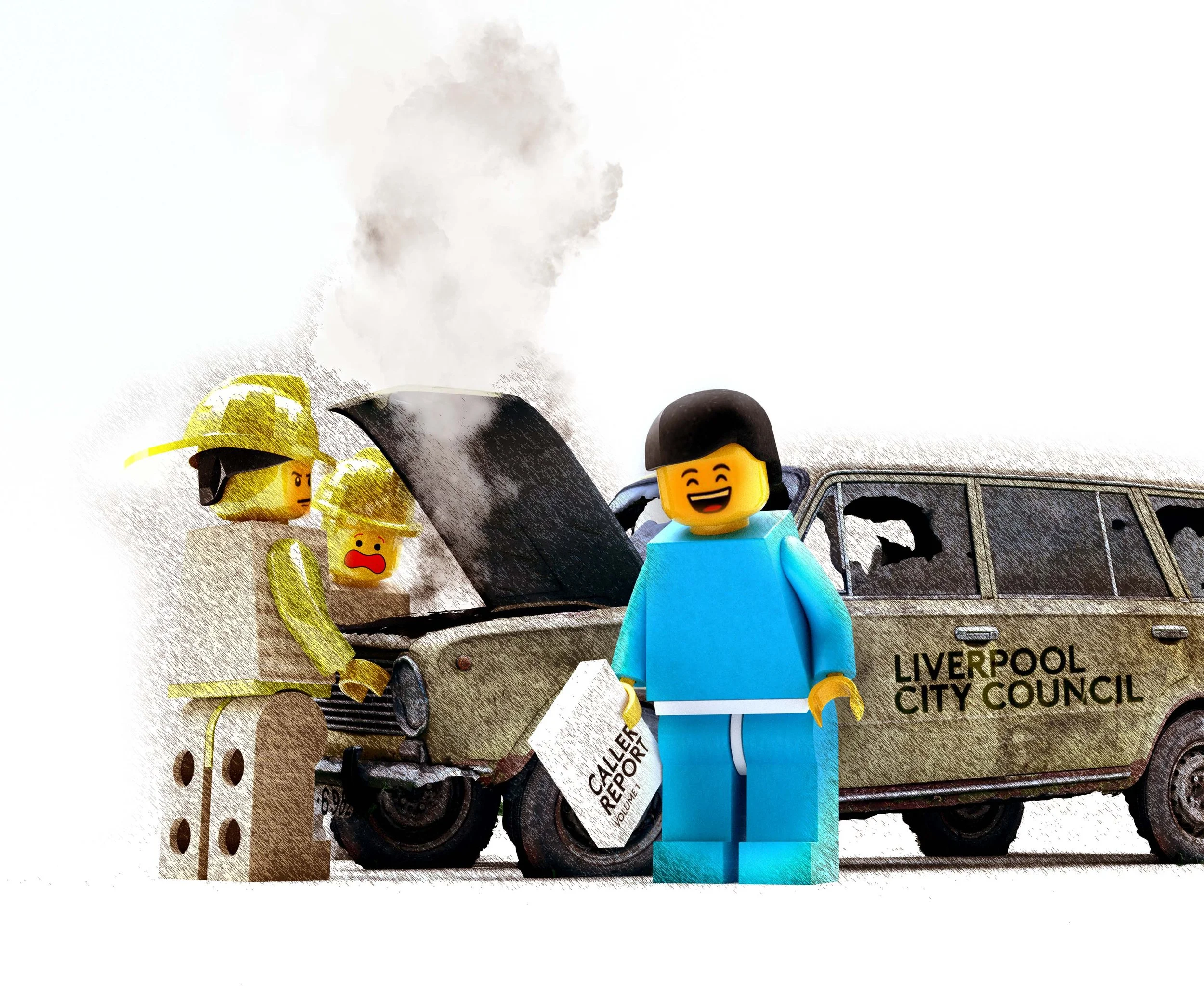Recent features
Referendum or bust – Liverpool’s last chance?
A discredited administration hamstrung by scandal. A weakened leader eyed by pretenders to the throne. A collapse of trust. And, underlying it all, a sense of drift and a loss of status in the world. For Boris Johnson’s Britain read Joanne Anderson's Liverpool. Both increasingly tottering on the precipice.
Liam Fogarty
A discredited administration hamstrung by scandal. A weakened leader eyed by pretenders to the throne. A collapse of trust. And, underlying it all, a sense of drift and a loss of status in the world. For Boris Johnson’s Britain read Joanne Anderson's Liverpool. Both increasingly tottering on the precipice.
Of course, it would be unfair to blame the city's current Mayor for more than a fraction of the woes afflicting Liverpool and its council. But her discarded pledge of a referendum to decide on whether to keep Liverpool's mayoral system was more than just another politician's broken promise. It was an affront to local democracy. The pitifully small response to the council’s subsequent governance consultation – just 3.5% of Liverpool residents replied - was inevitable. Launched in March, and conducted almost entirely online, the process was an artist's impression of a democratic exercise. The letter sent to each city household, directing its recipients to the Liverpool – Our Way Forward website, looked and read like a tax demand. Residents had 3 months to reply but a council taxpayer-funded "Have Your Say" supplement to promote the consultation was published with the Liverpool Echo on June 10th a mere ten days before the submission deadline. Perhaps if they were going to be this half-hearted they shouldn’t have even bothered. Its four vacuous pages contained plenty of room in which to set out the arguments for and against the various governance models on offer. Incredibly, it did not do so. An opportunity for meaningful engagement with Echo readers was spurned in what became a literal waste of space.
So what is to be done?
In his ground-breaking mayoral election campaign last year, as Liverpool absorbed the findings of the Caller Report into council misconduct, Independent candidate and eventual runner-up, Stephen Yip, called for a "re-set" of Liverpool City Council. He demanded top-to-bottom reforms in response to Caller's damning discoveries. The re-set phrase proved popular and was soon taken up by Labour's candidate, Joanne Anderson during her campaign. Once elected, however, she abandoned her commitment to resolve the mayoralty issue by means of a public vote, claiming a consultation would cost less than a full referendum which she deemed too expensive to justify. Since Joanne’s election, we have seen backsliding on the promises of more transparency and scrutiny of council business. Caller’s recommendation for a significant reduction in the number of councillors has been ignored, with the current 90 councillors being reduced merely to 85. Meanwhile, government-appointed commissioners now report that in several respects our council is going “backwards not forwards” in dealing with the issues it faces.
The loss of millions of pounds thanks to a botched energy contract showed systemic failings were not confined to the departments excoriated by Max Caller. There’s talk of more commissioners being drafted in, and more departments falling under their iron fist as skeletons continue to tumble out of closets. Not so much a re-set, then, as a return to politics as usual in Liverpool.
Stephen Yip and I agree that the first step towards an actual re-set is to let the people of Liverpool decide how their city should be led. Liverpool is local democracy’s ‘black hole,’ the only major city in England to have repeatedly denied its residents the chance to vote on how it should be run. The idea that Liverpool's citizens should be able to decide whether to keep or scrap the mayoral system is anathema to the control freaks at the Town Hall. Our politicians won't give us the mayoral referendum we are entitled to unless they are forced to.
Former Independent Mayoral Candidates, Liam Fogarty and Stephen Yip, launch ReSet Liverpool, a campaign to force Liverpool City Council to run a full referendum on city governance.
ReSet Liverpool
That’s why we are launching ReSet Liverpool, a petition-led campaign to give the people of the city the referendum they were promised. We reject the council's attempt to take such a huge decision on the city’s governance by itself. Options for the future running of Liverpool should be put directly to its residents at the ballot box.
Our petition aims to secure the 16,500 signatures (5% of the city's electorate) needed to trigger a referendum on whether Liverpool should retain the post of directly elected Mayor. A referendum held next May to coincide with scheduled elections for a Mayor and local councillors would come at minimal additional cost.
The final say on this issue should belong to the people, not politicians. It’s a matter of principle. Self-serving attempts to sideline the electorate are destructive. They weaken the already-strained connection between the people of Liverpool and their local council and lead to greater cynicism and indifference.
“The final say on this issue should belong to the people, not politicians. Options for the future running of Liverpool should be put directly to its residents at the ballot box.”
Without a referendum, Liverpool’s politicians are likely to revert to type. If they do move to abolish the mayoralty without public consent, then the simmering – and largely unreported - power struggles inside the council’s majority Labour group will burst open, absorbing the time and energies of all those involved. Mayor or no Mayor, in May 2023 every Liverpool council seat will be up for grabs on new electoral boundaries. As what is now 30 wards morphs into a whopping 70 smaller ones, once safe council positions will be under threat as councillors from the same party will be forced to compete with each other. The jockeying to be selected as candidates has already started and local parties’ fratricidal tendencies will be given full rein. The ward elections themselves will provide ideal conditions for the kind of hyper-local political warfare that appeals to party activists but no-one else. The chances of such a process producing a clear city vision, strong civic leadership and a coherent policy platform will be remote. Not for the first time, Liverpool politics will be all tactics and no strategy.
For ReSet Liverpool, a referendum on the mayoralty is the very least the people of this city deserve. May be it can also be the start of a broader campaign to reform our council and renew our city. If you are registered to vote in Liverpool, download a petition form (HERE) and if they live in Liverpool, get your friends, family and neighbours to sign up. Together, we have a chance to help kick-start that overdue process of civic renewal. It could be the last chance we’ll get.
Liam Fogarty is co-founder of ReSet Liverpool. A journalist, broadcaster and lecturer, he ran as an independent in Liverpool’s first Mayoral Election in 2012, finishing second.
Further Information
To find out more about Reset Liverpool and to download a copy of the petition, visit www.resetliverpool.org. Note: Only Liverpool residents over the age of 18 who are registered to vote can sign the petition. Completed petition forms should be returned to:
Reset Liverpool
301 Tea Factory
Fleet Street
Liverpool
L1 4DQ
Share this article
What do you think? Let us know.
Write a letter for our Short Reads section, join the debate via Twitter or Facebook or just drop us a line at team@liverpolitan.co.uk
Is profit a dirty word in Liverpool?
Touting fairness and social purpose, Liverpool's city leaders have become obsessed with ethical business practices at the expense of investment. So how did profit become such a dirty word?
Paul Bryan
Liverpool is, as the oft-told story goes, famously a socialist city. From the powerful campaigning firebrand, Bessie Braddock in the 1950s, through Derek Hatton and The Boys from the Black Stuff all the way to union-supremo Len McCluskey, and the huge, open-air campaign rallies which treated Jeremy Corbyn as saviour. Bar the occasional intermission from the Liberals, Labour has pretty much had its own way since the Beatles broke up.
One common thread through the politics of all those years is a strong dose of what I’d call working class patrician moralism – with the leaders of the movement strongly convinced they know what’s good for the rest of us. As Steve Fielding noted in The Spectator, for better or worse, Labour has always been on a moral crusade, with its core supporters convinced they are on the right side of history, particularly in the fights against inequality, and for social justice. Occasionally, this has taken a semi-religious turn such as when ex-Prime Minister, Tony Blair declared himself ‘my brother’s keeper’, though this moral high-handedness may also have played its part in Labour’s last historic general election defeat under Corbyn – with Blair himself urging the party to stop ‘deluding ourselves that belief in our own righteousness is enough’. In Liverpool though, this ‘Labour knows best’ quality appears to be a home banker for success at the ballot box, even in the face of some quite outrageous revelations from the recent Caller Report into the workings of Liverpool City Council and the office of ex-Major Joe Anderson.
Aspiration, anyone?
“Why are people buying yachts? What do you need a yacht for, for heaven sake?”, exclaimed Liverpool City Council’s now Deputy Major and economic lead, Jane Corbett in a public debate hosted by The Royal Society of the Arts on one of those glorious pre-Covid days of 2018. ‘Because you might want one’ didn’t seem like the kind of answer, Councillor Corbett would give the time of day. Clearly there are some things one just shouldn’t spend your money on. The moralistic tone remains alive and kicking.
A deep ideological failure lies at the heart of the city region
Quibbles about the advisability of ocean-going luxuries aside (from a councillor representing a maritime city), there was something else notable in that discussion. Leading a debate on ‘How not to run an unfair business’, was a certain, Charles Wookey, CEO of charity, A Blueprint for a Better Business (BBB). You may not have heard of them, but Liverpool City Council certainly have. Their ethical business pitch has been adopted wholesale by the city’s leadership in both the pre-and post Joe Anderson days. Liverpool’s ‘Inclusive Growth Plan for a Stronger, Fairer City’, published in 2018 along with their Council Procurement Policy, and Fair City Policy were straight out of the BBB playbook; as is the just published 2021 City Plan by Team Liverpool, a collection of the city’s leading lights in the public and third sectors. The adoption of these principles which coalesce around the idea of ‘fairness’ is likely having a profound effect on the city’s approach to attracting investment and its hopes for post-Covid recovery. From informing the overall meta-diagnosis of Liverpool’s economic problems and its preferred solutions, to the instigation of new restrictions on the terms under which the Council is prepared to issue contracts of work, ‘fairness’ is the lens through which the city’s future opportunities will be filtered. Or at least, that is the stated intention. Moonlighting as a member of Blueprint’s Advisory Council, it’s likely Councillor Corbett has played the key role in drawing Liverpool’s leaders into BBBs way of thinking and their (albeit free) management coaching services.
The high priests of purpose-driven business
Quite how this adoption of fairness may affect Liverpool’s economic future, is something I’ll get to later, but first it’s worth asking, is there anything sinister about this relationship between Liverpool’s leaders and Blueprint? No. There’s no conspiracy here. But is it something we should be worried about? Perhaps. After all, if Blueprint have the ear of those responsible for driving much needed investment into the region, it’s important to understand what is being advocated and what effects it’s likely to have on the ground. Especially because BBB have a somewhat pessimistic view on the traditional role of the private sector and are keen to change the way it works. In essence, they believe the world needs a ‘system change’ in which businesses are driven, not by profit, but by a ‘purpose’ that benefits society. They want to see our economic system “optimised for human wellbeing and a sustainable eco-system”, rather than for growth. As Wookey goes on to explain, they are out to displace two dominant ideas – “one, that the purpose of business is to maximise profit, and the other, that people are self-interested and motivated simply by money, status and power.”
For Blueprint For A Better Business, the search for profit, allied to that pesky desire to want more (growth) is put in the dock, tried and found guilty of crimes against society. You’ll be familiar with the narrative because these days it passes for common sense. The sins of business or at least large corporations, we’re told, are legion. Hooked on short-term profits and thinking of nothing but shareholder value at the expense of everything and everyone else, large businesses are seen as the fox in the henhouse, in need of some serious therapy to get over their compulsion to be a destroyer of worlds. If you are haunted by nightmares about the excesses of capitalism – from the oil spills of Deep Water Horizon to the sweat shops of Thailand, this sentiment will strike a chord. Closer to home – zero-hours contracts, glass-ceilings and the peddling of sugary drinks to the obese are just the tip of a well-rounded rap sheet of sin.
You could be forgiven for thinking these ideas sound kind of socialist or green-socialist and you can understand why these sentiments might appeal to those of a left-wing persuasion - the Left have been hankering for a system change since, well, forever. But and this is interesting, behind BBB lies not an activist fringe group, but a team of hardened senior business professionals. Blueprint count amongst their number former executives from organisations such as Unilever, M&S, UNESCO, Goldman Sachs and the TUC. And they were founded by an Archbishop (of Westminster). If anything, their roots lie in Christian morality and the belief that everybody should be treated with dignity and that we are never more fulfilled than when in service to others.
An unlikely moral alliance
So, what you find is two things coming together that can comfortably live in an accommodation. A moral desire to be and do ‘good’ in business circles and a deep-felt criticism of the failings of the market on the Left. From both angles, they feel the need for something new. But, and here’s a bit of a kicker – outside of the odd Extinction Rebellion march and the extremes of Momentum, nobody is really asking to completely up-end capitalism (let’s face it, not even the Chinese). Partly, because we’ve seen some of the alternatives and they weren’t great. But also, because well … we need business and everyone knows it – especially those who work in one. Or buy products from one. Or who have the good fortune to spend the money raised from taxing them. Money makes the world go round. So, with a deep breath, the conclusion is reached - what we need, it seems, is a Faustian pact.
And that’s where Blueprint For A Better Business comes in. They take the high moral ground and try to translate it into some kind of actionable programme for business leaders and the politicians who regulate them. And the price of the ticket is simply accepting that making a profit is not enough. Or even a worthy pursuit. It’s something that is allowed but only as a reward for achieving a definable social purpose as part of a renewed social contract between business and society. Even then profits are only acceptable if they are ‘fair’.
As a result, for businesses, dealing with the local authority becomes more challenging. If you want their ear and their help, increasingly you need to show you’re hitting or at least on a journey to hit Blueprint’s five core principles – that you’re honest and fair; a good citizen; have a social purpose, are a responsible employer and are a guardian for future generations. Sure, some of those translate to perfectly decent goals such as welcoming more scrutiny, achieving the Real Living Wage or paying your taxes on time. But many others are just plain subjective. Who gets to decide what is ‘fair’? And what qualifies those who sit in judgement?
It’s so tempting for public authorities to create a wall of additional requirements that make it harder for businesses to focus on their core task – and these are additionally burdensome for smaller organisations who just don’t have the bandwidth to keep up. What’s more, because fairness (whether outcomes or in process) is so subjective, prejudices can be projected onto the process of deciding who is and isn’t a worthy business partner, which can have disastrous unintended consequences.
Monetising social value
How’s that for a ‘pro-investment environment’? Can you imagine the Google’s and Apple’s of this world knocking down the city’s door, with those kinds of trade-offs? How about Amazon? You know, maybe they would. After all, we live in the age of the activist CEO. Of IKEA and Grolsch suspending their adverts from the new TV broadcaster, GB News, because the station didn’t match their ‘humanistic values’; while in the light of the Black Lives Matter protests, racial equality is now used to sell sausages. I doubt there’s a single business school that isn’t running modules on Corporate Social Responsibility (CSR). The mantra that ‘Being Good is Good for Business’ is somewhat of an unchallengeable tenant of acceptable belief – even if the data is less convincing.
Of course, it does raise the question, if you are being good to be seen to do good so that you can personally benefit, are you still doing ‘good’? For anyone who has seen the documentary, The Corporation (2003) or read the book, you’ll know that big business has been described as psychopathic for this very reason. They have a tendency to reflect back what they think you want to hear, so that you will do what they want you to do (buy their products). But to be sceptical for one minute, the morals and values to which business attaches itself, tend to be fluid. As writer, Nick Asbury writes in his incredibly insightful article for The Creative Review, when brands like Dove, Pepsi and McDonalds mix social issues with a sales message, not only does it come across as crass, but “Whenever you see a brand adopt a cause – whether it’s Andrex doing Clean or Dove doing Feminism – it’s always with the zeal of a recent convert. They are going to be the one to lead the conversation…because brands always have to cast themselves as the hero.” Damn right!
Can councils avoid being gamed?
Of course, councils like Liverpool know that when they are encouraging employers to act fair and be enlightened and ethical in their dealings, those businesses (especially the big ones who have more budget and resource) are more than capable of gaming the system. For example, paying for trees to be planted to counter-act emissions is generally seen as ‘greenwash’. Donating to a foodbank when you are squeezing the life out of farmers would likely go in the same category. All it takes, is a small charitable donation, a glossy video and social media campaign and hey presto, you are on the right side of the moral maze. Even better if you managed to cut your plastic use by 10% or start a conversation about body shape. This does point to a certain naivety in BBBs position and that of our elected local representatives. Who really wants to be taking moral lessons from a business? Did anyone vote for them? What is it about their constitution that makes us believe, that when the chips are down – their ‘purpose’ is anything other than to do the thing that allows them to continue to exist – making a profit?
I should point out that the purpose of this article is not to attack business – but to defend it from those who would wrap it up in unnecessary restrictions sourced from their own Instagramable prejudices. There are a host of dangers hidden under that appealing label of ‘fairness’.
CEOs – pack in the inferiority complex
But first, business leaders need to remember that their companies do already have a ‘social purpose’ and it’s one they don’t have to apologise for. Successful businesses provide products and services that customers want. And those outputs make people’s lives better – saving them time, bringing pleasure, opening up new opportunities and experiences. They innovate new technologies and processes transforming productivity and delivering progress across society. They create wealth – investing in jobs which transform lives, because there is one thing you can know for certain – if you want to give your life some purpose and you haven’t got a job, the first thing you should do, as psychologist Jordan Peterson recommends in his book, 12 Rules for Life – is get a job. No matter how crummy the job, you’ll feel better about yourself and ready to make the next step. The profits of business also fund every social programme in existence - from educating the next generation, to the safety net of social care. Maybe our CEOs should spend less time worrying about their lack of purpose or signalling their virtue and more time remembering that their core profit-making mission is one that delivers more benefits to society than any social state-funded programme. They do a magnificent job of making billions of lives better. And they do it, by tapping into the core human motivation to improve your lot. Is it time to resuscitate Gordon Gekko?
Some investors not welcome in Liverpool
“If Amazon isn’t on a journey (of improvement), no, I wouldn’t want them anywhere near us.” Back to Liverpool’s Deputy Major, Jane Corbett and that public debate. She was asked if Liverpool would follow New York’s lead and reject a big business like Amazon if they were looking to invest. She’d already said she takes a tick list of the 5 core Blueprint For A Better Business values around with her when she visits local companies. “We’d sit down and have a talk… Are they going to benefit the city? Are they going to pay us proper business rates? Why are they coming to Liverpool? Because we’ve got people so desperate, they might work for them?”
Let that sink in. Some people might be so desperate that they’d choose to take a job. The Councillor would save them from that misery. BBB values being used to turn away investment.
Leaving with a pocket full of dreams and returning with the same.
Corbett talks about commerce in very moral terms – good investors, good money, good businesses - presumably in contrast to bad investors, bad money and bad businesses. Perhaps this is not entirely surprising in a region still reeling from revelations about alleged cronyism, property deals gone wrong and lack of accountability under ex-Major Joe Anderson. But, given Corbett’s background in the Labour movement, it seems plausible that her moral qualms are founded at least in part by a generalised feeling of antipathy towards the dirty business of business. An instinct that at best, sees private enterprise as an unfortunate price to be paid in return for a state-funded shopping list of social provision. Back to that Faustian pact. If you’re going to sup with the devil, use a long spoon. Or in this case, an obligation for business to be purpose-led, not profit-led. I wonder what the Dragons Den presenters would make of that? Maybe they’d agree? The plan, according to Corbett is to show BBB definitions of what makes a good business to the next generation of young people so that “hopefully it becomes embedded in the city.”
But what does it mean in the here and now?
In one aspect, Liverpool is very far from unique. In 2013, central government introduced the Public Services (Social Value) Act, which requires all those responsible for commissioning public services to think about how they can derive wider social, economic and environmental benefits from any contract. Public servants keep a keen eye on additional benefits for their area or stakeholders – be it jobs and apprenticeships, green initiatives, equality and inclusivity drives and so on. The public procurement process has become more complex as a result and more subjective as businesses applying for work need to provide evidence for a raft of measures that fall outside their core mission to provide a good quality service or product at the right price. The government freely admits councils have sometimes struggled to implement it, and issued an updated Social Value Model in December 2020, which for now will be used by central government departments only.
The findings of the recent damning Caller Report into Liverpool City Council however, showed how good intentions can deliver poor outcomes. The report, led by an independent inspector, found “multiple apparent failures” in the council’s highways, regeneration and property management functions. Plots of land worth over £1m were sold for £1 plus overage – a share in future value increases. Sixty-five property deals negotiated by the council were examined by the inspector and problems were found with all of them.
What starts in the head - An economic misdiagnosis?
As reported in PlaceNorthWest, Caller questioned how social value had been interpreted under Joe Anderson’s administration - “the mayor’s…concept of social value was best achieved by employing contractors with a Liverpool postcode base” – which resulted in deals that failed to reach the council’s statutory duty to achieve best value. There you have it. Decisions founded in a moral position to extract social value (by choosing Liverpool-based suppliers) resulted in less value for local taxpayers. The ideas in your head shape the reality on the ground. Attempts to pass off the administration’s inadequacies as merely an embodiment of the ‘bad apple’ theory – where all the faults are caused by the actions of a few rogue individuals, seem unpersuasive as a complete explanation.
What if some of the biggest flaws in the Joe Anderson administration were ideological, rather than just managerial? What if their understanding of what’s ailing the Liverpool economy and what it needs led them to make bad decisions? What if those flaws are still present today under the Mayorship of his replacement – Joanne Anderson (no relation)? After all, though she may have changed the makeup of the cabinet – many of the councillors were elected under both leaders. What if Liverpool Labour is the problem? And what if the council’s relationship with Blueprint For A Better Business is the clearest indication yet of what’s going wrong?
Snubbing the PM, for the people
"I can never respect somebody who won't apologise for what he said…And he won't do that and until he does that, I've refused to shake his hand when it was offered to me last year and I'll continue to do that." So said Steve Rotherham, the recently re-elected Liverpool City Region Metro Mayor talking about his relationship with the country’s most powerful man, Boris Johnson, the UK Prime Minister. As he explained on the BBC’s Political Thinking Podcast, the bad blood dated back to the 2004 Spectator article about the Hillsborough disaster that was published (but not written) by Johnson when he was the magazine’s editor.
The piece had wrongly claimed the city was in denial about the role "drunken" fans had played in the 1989 tragedy and had a tendency to "wallow in victim status". Understandably, the article caused wide-spread offence throughout Liverpool.
Talking about the work Steve had done with Boris over implementing Covid testing trials in Liverpool, Steve concluded, "it was really difficult for me to do business with somebody I had no respect whatsoever for, but I had to do the right thing... for the people in the Liverpool City region."
Did Steve do the right thing? Putting aside the question of whether Boris has already apologised (possibly repeatedly), the primary responsibility of a Regional Mayor is to put the interests of their constituents first. Steve comes across as a moral and decent man but on this occasion, he may have put his personal feelings ahead of his duty. Alienating the Prime Minister, who as prize-giver-in-chief has more influence over the direction of government investment than anyone else, doesn’t feel like the pragmatic move. So far, the UK government’s ‘Levelling Up’ agenda, which has seen government departments relocating from London to other parts of the country, has by-passed Liverpool. It is certainly not the first time the city region has missed out on big-ticket investments. From High Speed 2 to the relocation of the C4 headquarters to the north, or even the new UK Infrastructure Bank, Liverpool remains off the map.
Sticking it to the Tories was also a favoured pastime of Joe Anderson, who bitterly and publicly complained about the effect of Tory cuts to the council’s budget. Many times, he took to the airwaves to gripe; sometimes coloured with doom-laden predictions about the inevitability of riots. Even on the occasions when he had the then Prime Minister, David Cameron’s attention (for once) he quickly found himself ensconced in tit-for-tat battles, such as the time in 2013 when the goal of promoting the inaugural International Festival of Business was overshadowed by public arguments between the two men about the city’s rough treatment by the government. How to win friends and influence people it was not. Playing to the gallery it certainly was.
Lack of belief results in puppets
What ties the tales of Steve and Joe together is that sense of outraged moralism triumphing over pragmatically doing what needs to be done to get the rewards for your people. Sometimes, however unpalatable, you have to suck it up. And maybe, if you’ve stopped really seeing the prize on offer and how big it could be, and just how much you are missing out on – well then maybe you’re just less motivated to try. Maybe your words about aspiration and the ‘best days being ahead’ are hollow and just for the gallery, because deep-down you don’t believe it yourself. While Joe Anderson, when in power, was playing with (giant) French puppets (x3), grandstanding about Tory cuts, and messing about with bus lanes, other regions were taking a more pragmatic view, doing the hard yards in Westminster and private sector boardrooms to secure the influence which led to vital investments such as the nearly £40m Manchester pocketed for establishing the National Graphene Institute in 2015 or the 2022 Commonwealth Games which went to Birmingham. It’s hard to think of many (any?) Liverpool equivalents as the leadership tended to focus on ultra-short-term photo-opportunity wins such as the International Business Festival, now much shrunk and rebadged in the favoured moral terms, ‘Good Business Festival’.
Even Joe’s annual trips to MIPIM, Europe’s largest property convention, which were often treated to excitable rolling commentary and great fanfare in the Liverpool Echo, tended to result in little more than glossy CGIs of the still largely unbuilt Liverpool Waters. Leaving with a pocket full of dreams and returning with the same has generally been the order of the day. So, either Joe’s team were not very good at pitching or coming up with investable ideas, or they didn’t try hard enough. Maybe, it just didn’t seem that important to them.
In Liverpool business circles, the talk never strays far from the subject of skills, or more precisely the lack of them. When not re-locating their businesses out of the region like premium sports brand Castore did only recently, CEOs like Asif Hamid of Wirral-based, The Contact Company are left lamenting the shallow talent pool and the slowing effect it has on growth. The worry is that too many leave school without qualifications and families that have never seen anyone attend university become cut-off from the best opportunities. But there is nothing new in this. Liverpool has suffered a brain drain for decades –as many of the best and brightest are forced to seek opportunities elsewhere. Even today, with its healthy student population, the city has a graduate retention rate lower than many of its city rivals. There’s no mystery here. Jobs are the trigger for rising educational attainment. Fail to build a diverse and deep job market and those that can, will move elsewhere.
Foreign Direct Investment (FDI) 2020
Ranking UK cities & towns by the number of FDI-financed projects they have secured (sub-selection displayed only). Liverpool ranked 14th between 2011-2020 but has slipped to 17th in the last year of recorded data.
Source: EY Attractiveness Survey 2021 (UK)
Liverpool’s economic balance sheet
There are positives to talk about the Liverpool City Region economy – the growth of the port, rising demand for industrial and logistics space, the successes of the visitor economy and the beginning of a revival in health care sciences. The unemployment rate has fallen from 10% to 4% since 2014 and the number of people holding degree level qualifications is slowly on the rise. Plus, the alarming decline in total population has thankfully been put into reverse. All to the good. But beware the relentless positive spin from those naturally invested in the regeneration game. A cold look at the other side of the balance sheet reveals that Liverpool is still grossly under-performing. The Draft Industrial Strategy published by the office of the Metro Major reveals the City Region is still in need of an economic miracle and sets out the ‘underlying fragility’ of the economy. Liverpool is the fourth most deprived local authority in England, with a life expectancy 6 years lower than the national average. Its employment rate (even pre-pandemic) was also lower than average and the ONS estimates 51,000 of its residents earn below the Real Living Wage. The city of Liverpool ranked 17th for Foreign Direct Investment in 2020 placing it below such economic luminaries as Peterborough and Northampton and only one place above Newport. It’s doubtful if it ranks much better for Domestic Private Investment, though it’s hard to tell for sure as the statistics tend to get unhelpfully rolled into the North West as a whole, likely hiding a multitude of inequalities. The office take-up statistics, a solid measure of the strength of any city’s business activity are miserable. Of the UK’s big nine cities outside of London, Liverpool has the 8th lowest 10-year average (approx. 533,000 sq feet per year) compared to over 2,000,000sqft in Manchester. That’s a crippling 43% below the average take-up across the nine cities. It also commands the lowest rental rates. The building of new stock outside of the recent Paddington Village development is all but non-existent. And that was true long before anybody had heard of Covid. Perhaps most worryingly, Liverpool’s productivity rates which measure the output per worker (Gross Value Added per head) are only 74% of the UK average. Too many of the region’s employment opportunities are focussed on low productivity sectors and Liverpool just doesn’t have anywhere like enough representation in the high-tech industries of tomorrow. As Rafa Benitez, the manager of Liverpool’s two football clubs might say – FACT.
More investment please
What should we conclude from this barrage of data? Liverpool needs more investment like a vampire needs blood. It needs more of everything. More investment from the state, from the private sector, from overseas, from home-grown businesses. It needs more access to venture capital. It needs to diversify, and attack sectors in which it is currently losing out to others, rather than throwing up its hands in defeat and forever banging on about the ones where it is strong now. It needs to step up and compete with its rival regions head-on rather than accepting a subsidiary role. Be better at playing the ‘influence game’. Resource key development and regeneration functions properly with the right level of expertise. Be ambitious and demanding. Fight the right fights for its people. But its leadership won’t do what’s needed as long as it is hooked on the wrong thing – its focus on fairness and the metrics of inequality, not realising they are the symptoms, not the cause of this prolonged failure to attract enough investment, enough ‘stuff’.
Average annual sq ft office take up in the Big Nine Regional Cities (2011-2020)
Source: The Big Nine, Quarterly update of regional office activity
Rationalising low aspiration
Liverpool’s current obsession with morals and good business ethics is at the heart of this misdiagnosis. It is the rationalisation of limited aspirations. Accepting the idea that economic growth is a problem, not a solution and seeing business as something which needs to coached away from its destructive tendencies rather than the source of wealth creation, is forcing the city down a dead-end. What they are left with is a focus on redistribution, because they can’t see the transformative power of growth to improve people’s lives. Fairness, while worthy, becomes about moving the counters around the checkerboard. Fiddling with the rules, but never really changing the game. The leadership has accepted an anti-business, low aspiration narrative because it is misdiagnosing the region’s core problems and its own role in adding to them.
Fairness means accepting defeat
When a moral focus on being a good citizen meets a left wing reflex to identify inequality as the primary social ill and businesses and capitalism as the source of those problems – you end up with a potentially toxic investment agenda that is christened under the name, ‘Fairness’. Instead of understanding that increased investment drives social opportunity, you instead end up fixating on redistribution issues – chasing social justice by achieving a more equitable sharing of the same level of resources that have already proven themselves to be inadequate. As definitions of what is ‘fair’ shift you find yourselves creating a mountain of regulations or informal requirements which make it ever harder for business to act in an entrepreneurial way, particularly prejudicing those small organisations that don’t have the bandwidth to play the game.
But worse – you’ve stopped even trying to grow the cake in any meaningful way, because without realising it, you’ve accepted the limits of low aspiration – your efforts to attract investment become sporadic and half hearted – besides, who wants new jobs when we have a climate emergency on? They’ll only make things worse.
A deep ideological failure lies at the heart of the city region and particularly Liverpool’s sub-par performance. One that sees red lights and limitations everywhere. One that accepts low ambitions as if they were part of the natural order. One that doffs its cap to other cities, for want of imagination about what could be. The kind of ideological blind-spot that leaves our leaders wondering why anyone might want a yacht; that diagnoses symptoms as cause and defaults to lazy moralising about the common good, while wrapping businesses up in ever more unprofitable, energy-sapping restrictions. The city region needs to wake up and kick out the snake-oil salesmen of purpose-driven business from the corridors of power. For a maritime city, it has long since hit the iceberg. It’s time to stop re-arranging the deck chairs. This Titanic needs more lifeboats. And its marinas need more yachts.
Paul Bryan is the Editor and Co-Founder of Liverpolitan. He is also a freelance content writer, script editor, communications strategist and creative coach.




































